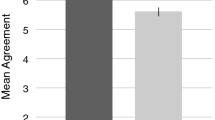Abstract
Four experiments investigate the folk concept of “understanding,” in particular when and why it is deployed differently from the concept of knowledge. We argue for the positions that (1) people have higher demands with respect to explanatory depth when it comes to attributing understanding, and (2) that this is true, in part, because understanding attributions play a functional role in identifying experts who should be heeded with respect to the general field in question. These claims are supported by our findings that people differentially withhold attributions of understanding (rather than knowledge) when the object of attribution has minimal explanatory information. We also show that this tendency significantly correlates with people’s willingness to defer to others as potential experts. This work bears on a pressing issue in epistemology concerning the place and value of understanding. Our results also provide reason against positing a simple equation of knowledge(-why) and understanding(-why). We contend that, because deference plays a crucial role in many aspects of everyday reasoning, the fact that we use understanding attributions to demarcate experts reveals a potential mechanism for achieving our epistemic aims in many domains.




Similar content being viewed by others
Notes
Some participants were assigned to a third false condition that we do not report here. In it Richard held a coherent set of false beliefs that he used to explain Mercury’s observed orbit. On average, participants ascribed very little knowledge or understanding to Richard in this condition.
As Mauchly’s test indicated that the assumption of sphericity had been violated, χ 2(5) = 83.73, p < .001, the Greenhouse-Geisser correction for degrees of freedom was used, ε = .65.
Of 65 participants, the correlation between the across-domains deference question and knowledge and understanding attributions was undefined for 34 of them. Among those participants for whom the correlation was defined, there was no significant difference between the correlation with knowledge attributions and the correlation with understanding attributions, t(30) = .057, p = .96.
References
Bartsch, K., & Wellman, H. M. (1995). Children talk about the mind. Oxford: Oxford University Press.
Friedman, Michael. (1974). Explanation and scientific understanding. Journal of Philosophy, 71, 5–19.
Grimm, S. R. (2006). Is understanding a species of knowledge? British Journal for the Philosophy of Science, 57(3), 515–535.
Hempel, C. G. (1965). Aspects of scientific explanation and other essays in the philosophy of science. New York: Free Press.
Hofer, B. K., & Pintrich, P. R. (1997). The development of epistemological theories: Beliefs about knowledge and knowing and their relation to learning. Review of Educational Research, 67, 88–140.
Keil, F. C. (2003). Folkscience: Coarse interpretations of a complex reality. Trends in Cognitive Sciences, 7(8), 368–373.
Keil, F. C. (2006). Explanation and understanding. Annual Review of Psychology, 57, 227–254.
Keil, F. C., Stein, C., Webb, L., Billings, V. D., & Rozenblit, L. (2008). Discerning the division of cognitive labor: An emerging understanding of how knowledge is clustered in other minds. Cognitive Science, 32, 259–300.
Kelp, C. (2015). Understanding phenomena. Synthese, 1–18. doi:10.1007/s11229-014-0616-x
Kim, J. (1994). Explanatory knowledge and metaphysical dependence. Philosophical Issues, 5(Truth and Rationality), 51–69.
Koenig, M. A., & Harris, P. L. (2005). Preschoolers mistrust ignorant and inaccurate speakers. Child Development, 76, 1261–1277.
Kuhn, D., Cheney, R., & Weinstock, M. (2000). The development of epistemological understanding. Cognitive Development, 15, 309–328.
Kuhn, D., & Park, S. (2005). Epistemological understanding and the development of intellectual values. International Journal of Educational Research, 43, 111–124.
Lombrozo, T. (2006). The structure and function of explanations. Trends in Cognitive Sciences, 10, 464–470.
Lombrozo, T. (2012). Explanation and abductive inference. In K. J. Holyoak & R. G. Morrison (Eds.), Oxford handbook of thinking and reasoning (pp. 260–276). Oxford: Oxford University Press.
Machamer, P. K., Darden, L., & Craver, C. F. (2000). Thinking about mechanisms. Philosophy of Science, 67, 1–25.
Pritchard, D. (2009). Knowledge, understanding and epistemic value. Royal Institute of Philosophy Supplement, 64, 19–43.
Rosenberg, J. (1981). On understanding the difficulty in understanding understanding. In Herman Parret & Jacques Bouveresse (Eds.), Meaning and Understanding. Berlin: W. De Gruyter.
Scriven, M. (1962). Explanation, prediction, and laws. Minnesota Studies in the Philosophy of Science, 3, 170–230.
Shatz, M., Wellman, H. M., & Silber, S. (1983). The acquisition of mental verbs: A systematic investigation of the first reference to mental state. Cognition, 14, 301–321.
Sosa, E. (2000). For the love of truth. In Linda Zagzebski (Ed.), Virtue epistemology: Essays on epistemic virtue and responsibility (pp. 49-62) Oxford University Press.
Starmans, C., & Friedman, O. (2012). The folk conception of knowledge. Cognition, 124, 272–283.
Strevens, M. (2008). Depth: An account of scientific explanation. Cambridge: Harvard University Press.
Weinberg, J. M., Nichols, S., & Stich, S. (2001). Normativity and epistemic intuitions. Philosophical Topics, 29, 429–460.
Weiskopf, D. A. (2011). Models and mechanisms in psychological explanation. Synthese, 183, 313–338.
Wilkenfeld, D. A. (2013). Understanding as representation manipulability. Synthese, 190, 997–1016.
Wilkenfeld, D. A. (2014). Functional explaining: A new approach to the philosophy of explanation. Synthese, 191, 3367–3391.
Acknowledgments
The authors would like to thank the University of California, Berkeley, the John Templeton Foundation’s Varieties of Understanding project, and a James S. McDonnell Foundation Scholar Award for support of this work.
Author information
Authors and Affiliations
Corresponding author
Rights and permissions
About this article
Cite this article
Wilkenfeld, D.A., Plunkett, D. & Lombrozo, T. Depth and deference: When and why we attribute understanding. Philos Stud 173, 373–393 (2016). https://doi.org/10.1007/s11098-015-0497-y
Published:
Issue Date:
DOI: https://doi.org/10.1007/s11098-015-0497-y



